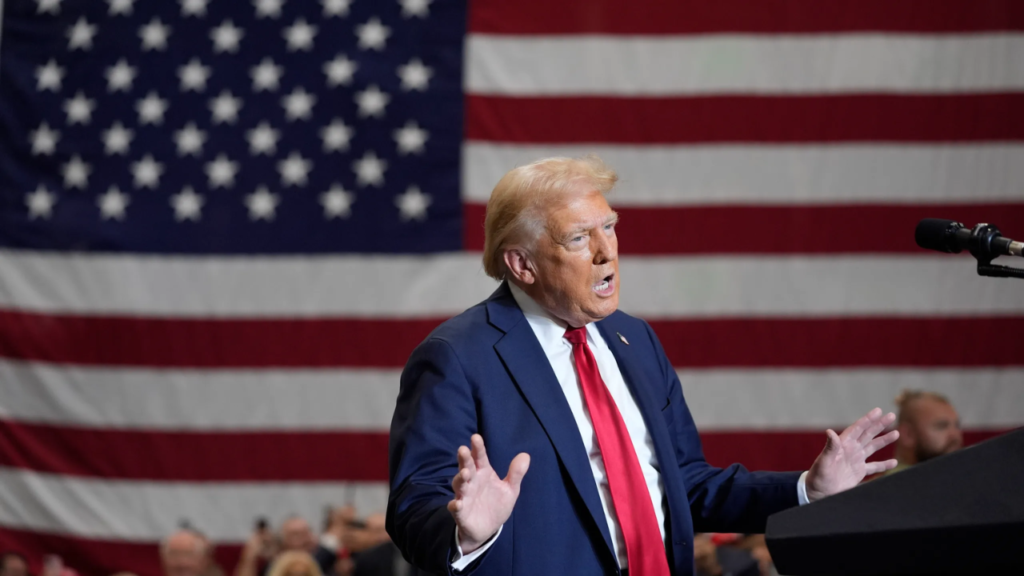
The ongoing legal battles of Donald Trump continue to make headlines, and one of the most significant cases involves a massive fraud judgment.
The central question on many minds is: Will Trump have to pay his huge fraud judgment? Recently, an appeals court has begun to assess whether the suit against Trump has gone too far, raising legal questions about the powers of the New York Attorney General and the future of this high-profile case.
The lawsuit stems from accusations that Trump inflated the value of his assets to secure favorable loan terms.
A trial court imposed a hefty $454 million civil fraud judgment, which has since grown to over $478 million with interest.
The judgment represents a major financial blow, and Trump’s legal team is working hard to appeal and overturn it.
At the heart of this case lies the debate over whether the Attorney General’s office exceeded its authority in pursuing the suit and whether Trump’s alleged actions truly harmed anyone.
Will Trump Have to Pay His Huge Fraud Judgment?
The answer to this question largely depends on the outcome of the appeal. If the appeals court upholds the original decision, Trump must pay the judgment.
However, the court is currently probing whether the lawsuit may have overreached. Trump’s legal team argues that the inflated valuations of his assets did not cause harm because the lenders involved were satisfied with the loan transactions.
Is Capitalism More Popular Than Taylor Swift? The Answer Might Surprise You
Furthermore, they claim that the financial statements were subjective and did not lead to any actual losses for the banks.
On the other side, the New York Attorney General’s office argues that Trump’s overvaluation of assets not only violated the law but also created risks for lenders and disrupted the integrity of the marketplace.
While some judges appear skeptical of the suit, others have expressed interest in defining the boundaries of the Attorney General’s power under the fraud statute. The final decision could take time, and Trump’s financial future hangs in the balance.
Questioning the Scope of the Attorney General’s Power
One of the key arguments in this appeal focuses on the authority of the New York Attorney General to bring such a lawsuit.
Some judges have raised questions about whether the case goes beyond the intended scope of the fraud statute used to target Trump.
The statute was originally designed to protect businesses and consumers from repeated fraudulent activities.
Trump’s legal team claims that no actual harm was done, pointing to the fact that the loans in question were repaid, and there were no victims or complaints.
However, the Attorney General’s office maintains that the fraud statute is meant to protect not only from past harm but also from potential future harm.

By inflating the value of his assets, Trump allegedly created risks that could have affected the financial system.
The judges are now tasked with determining whether the scope of the Attorney General’s power was properly applied in this case, or if the lawsuit went too far in targeting Trump’s business practices.
What’s at Stake for Trump?
For Trump, this case is not just about money—it’s also about his public image and his future business dealings.
Despite facing multiple criminal cases, Trump has shown particular interest in this lawsuit, attending several days of the trial in person.
The massive fraud judgment, now totaling over $489 million with interest, represents a significant financial hit.
Trump has even argued that posting a bond for the full judgment amount would be a “practical impossibility.”
The appeals court has already intervened to reduce the appeal bond amount to $175 million, allowing Trump to avoid the immediate threat of asset seizure.
However, if the judgment is upheld, he may still face serious consequences. The judgment could lead to the seizure of his real estate assets, bank accounts, and other financial holdings.
Additionally, rental payments from Trump Organization properties could be redirected to pay off the judgment, adding more pressure to his already strained financial situation.
Trump’s Legal Defense and Appeal Strategy
Trump’s legal team is raising several arguments to challenge the fraud judgment. One of their main points is that there were no victims in this case.
They argue that since the loans were repaid, and no lenders suffered losses, there was no actual fraud.
This defense hinges on the idea that financial valuations are subjective and that Trump’s estimates of his assets were conservative rather than exaggerated, as claimed by the Attorney General’s office.
Another argument focuses on the timing of the lawsuit. Trump’s lawyers claim that the statute of limitations should have barred most of the allegations brought by the New York Attorney General.
They argue that if the correct time limits were applied, the majority of the $464 million judgment would be eliminated.
However, the trial court ruled that the window for filing the lawsuit was extended due to Trump’s continued submission of allegedly fraudulent financial statements. This issue will be a critical factor in the appeal.
Mark Zuckerberg’s Daughter Dreams of Being Taylor Swift, But He Said No!
The Potential Consequences If Trump Loses
If Trump loses his appeal, the consequences could be severe. The judgment would become a lien on his Manhattan properties, and the New York Attorney General’s office could begin seizing his assets.
Additionally, rental income from Trump Organization properties could be redirected to satisfy the judgment, and his bank accounts could be frozen.
This would mark a major blow to Trump’s financial empire and could affect his ability to conduct business in the future.
The final decision from the appeals court will determine whether Trump has to pay the full judgment or if his legal team can succeed in reducing or overturning the ruling.
With his financial and business reputation on the line, the stakes could not be higher for the former president.
